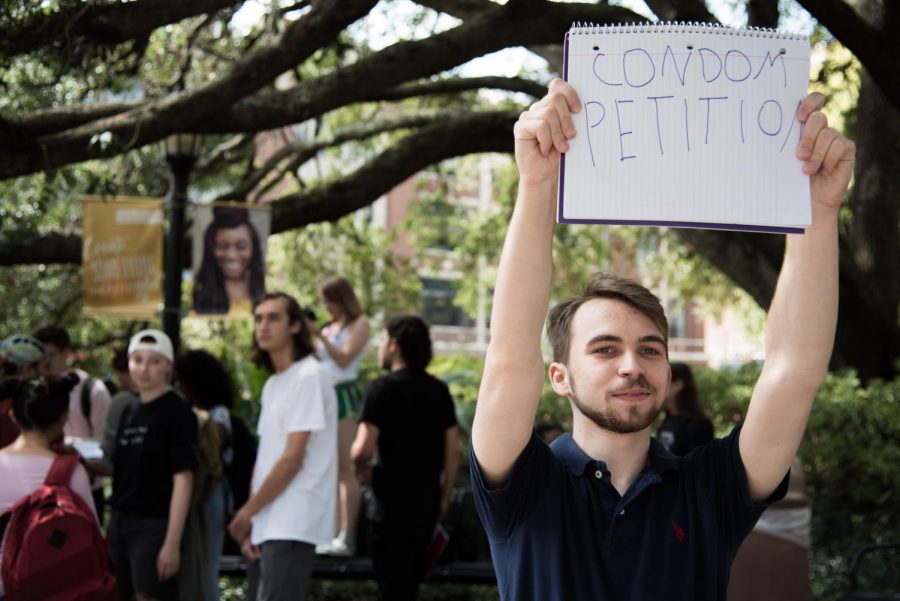Opinion: Loyola neglects sexual health
In this Sept. 2019 file photo, Gabriel Lesser, political science sophomore, holds a makeshift sign advertising Lxyno for Sexual Health’s petition to get Loyola to provide free condoms to students. Lxyno for Sexual Health was active throughout fall 2019 and spring 2020 advocating for sex education and access to contraception in the Loyola student community. Photo credit: Michael Bauer
March 6, 2021
For many of us, this past year has been the first time we’ve had to contend with a major health crisis in our adult lives. Whether it’s friends, family or ourselves, most of us have felt the grave impact of the disease. But maybe, to just as many of us who know how COVID-19 has only served to exacerbate a myriad of underlying conditions, the pandemic represents yet another case of systematic public health failings. And finally, to those of us who have been fighting for you, our esteemed friends and colleagues, and your basic human right to sexual health and reproductive justice, it represents a convenient distraction on the part of our administration and a gross demonstration of their bias and hypocrisy.
Late fall of 2019, I joined a coalition of students whose purpose was to push the administration to fully commit to living up to their motto of “Cura Personalis,” or care for the whole person. When we were met with inaction and disregard, it became apparent that we the student body would have to uphold that oath where our institution had failed to do so.
As we learned during the AIDS crisis (which, for those who know the facts, never really ended), when it comes to matters of public health, silence is a direct form of violence. As with any modern act of warfare came a series of guerilla public health actions and interventions, all unofficial, all unapproved. Truthfully though, we never sought to draw the ire of the administration, only to provide the contraceptive and reproductive products, services and education that Loyola has irresponsibly denied to their student body.
Despite collecting hundred of points of data over two student surveys, showcasing their major areas of improvement in reproductive health and justice, we were told to work within the confines of our administration and to seek change from the inside. While traumatizing anti-choice events are constantly given time, space and financial support, Loyola continues to refuse hosting prochoice speakers they’ve deemed as “controversial.” With the suppression of our voices when we protest, and subsequent witch hunt of our friends and colleagues, it is evident that working within their system serves neither our purpose nor fulfills the responsibility we now shoulder to our campus community.
It is a responsibility that, since the pandemic began, we ourselves have failed to uphold. While we’ve been able to maintain our condom distribution campaign, there is so much more we could, and should be doing. While I can only speak for myself, I ask you to accept this is as my formal apology, and recommitment to standing up for your right to sexual health once again.







Alex Dixson • Aug 7, 2021 at 4:17 pm
Austin you’re missing Emily’s whole point. No one said Loyola is the Catholic Church, but they are a Jesuit institution that is funded and founded by Catholicism and takes their views from the Catholic Church and has direct ties to them. With that in mind they aren’t going to promote or encourage sex outside of marriage. They just aren’t. There is no hypocrisy. Cura Personalis is caring for the whole person, that doesn’t mean encouraging things that directly go against the Bible’s teachings.
Austin Wallace • Apr 2, 2021 at 7:43 pm
Well first off, to the comment above, Loyola isn’t the catholic church. Secondly it doesn’t matter what the church says, the point here is that Loyola University New Orleans is objectively not meeting the health needs of the student body they charge tuition too. As a public health worker, I can tell you that this is a hard fact. Personally, I could care less about the school’s religious affiliation, my point stands that measurable health needs are not being met. I just find it ironic that their ideology preposes a care for the whole person, when that is clearly not the case. The hypocrisy is too blatant not to point out.
Emily Bourgeois • Mar 7, 2021 at 10:46 pm
As an alum, I am proud and fond of the education I received at Loyola University. But if we want to talk about “pro-choice,” we have a choice at what college we attend. Since, we chose to attend a Catholic university, we also chose to agree to disagree with the standards of the Catholic Church. The Catholic Church has not changed their views on sexual health and reproduction. The Latin phrase “Cura Personalis” does mean care for the entire person, but it is commonly used by the Catholic Church religious order, the society of Jesus and also the Jesuit order. We attend a Jesuit university which is built on the values of the Catholic Church, and the Church is clear on their stances with these issues.